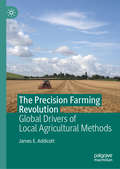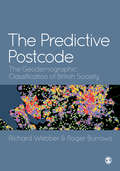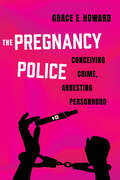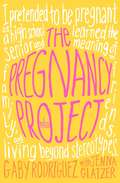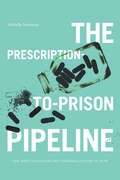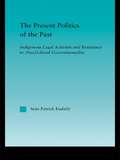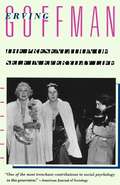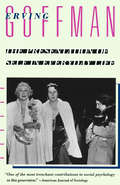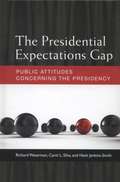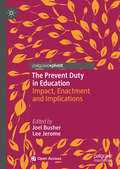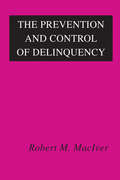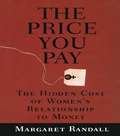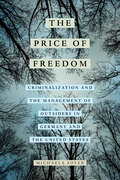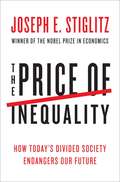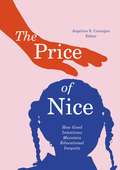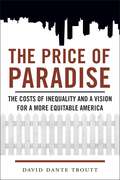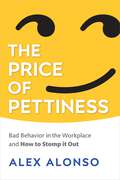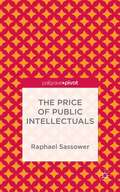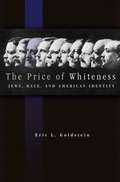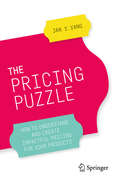- Table View
- List View
The Precision Farming Revolution: Global Drivers of Local Agricultural Methods
by James E. AddicottThis book examines the precision farming revolution in Somerset, England. It reveals the reasons why local farmers invested in autonomous systems and traces the outcomes of adoption. It describes the local and global drivers of the fourth industrial revolution, from world population growth, climatic and ecological crises, profit driven farming and government agri-tech grants, to the Space Race era. A new cultural method of intelligence, ideas and thinking, new organisational and control powers, was precisely what precision farming offered farmers and off-farm firms, who were able to remotely monitor and control natural environments and aspects of on-farm activities. As a result of local farmers opting into precision farming systems the power dynamics of industrial agriculture were reorganised and this book will offer readers an understanding of how and why.
The Predictive Postcode: The Geodemographic Classification of British Society
by Roger Burrows Richard WebberIt is not lost on commercial organisations that where we live colours how we view ourselves and others. That is why so many now place us into social groups on the basis of the type of postcode in which we live. Social scientists call this practice "commercial sociology". Richard Webber originated Acorn and Mosaic, the two most successful geodemographic classifications. Roger Burrows is a critical interdisciplinary social scientist. Together they chart the origins of this practice and explain the challenges it poses to long-established social scientific beliefs such as: the role of the questionnaire in an era of "big data" the primacy of theory the relationship between qualitative and quantitative modes of understanding the relevance of visual clues to lay understanding. To help readers evaluate the validity of this form of classification, the book assesses how well geodemographic categories track the emergence of new types of residential neighbourhood and subject a number of key contemporary issues to geodemographic modes of analysis.
The Pregnancy Police: Conceiving Crime, Arresting Personhood (Reproductive Justice: A New Vision for the 21st Century #10)
by Grace E. HowardDecades before the overturning of Roe v. Wade, pregnant people faced arrest and prosecution for supposed crimes against the fertilized eggs, embryos, and fetuses they gestated. The Pregnancy Police investigates the legal arguments undergirding these prosecutions and sheds much-needed light on the networks of health-care providers, social workers, and legal personnel participating in this ongoing surveillance and punishment of pregnant people. Drawing on detailed analyses of legislation, statements from prosecutors and law enforcement, and records from over a thousand arrest cases, Grace E. Howard traces the long history of state attempts to regulate and control people who have the capacity for pregnancy—from the early twentieth century's white supremacist eugenics to the end of Roe and the ever-increasing criminalization of abortion across the United States.
The Pregnancy Project: A Memoir
by Gaby RodriguezWhen high school senior Gaby faked a pregnancy as a project to challenge stereotypes, she also changed her life. Discover this compelling memoir from an inspirational teenage activist, now a Lifetime movie.It started as a school project, but it turned into so much more. Growing up, Gaby Rodriguez was often told she would end up a teen mom. After all, her mother and her older sisters had gotten pregnant as teenagers; from an outsider&’s perspective, it was practically a family tradition. Gaby had ambitions that didn&’t include teen motherhood. But she wondered: how would she be treated if she fulfilled others&’ expectations? Would everyone ignore the years she put into being a good student and see her as just another pregnant teen statistic with no future? These questions sparked Gaby&’s high school senior project: faking her own pregnancy to see how her family, friends, and community would react. What she learned changed her life forever…and made international headlines in the process. In The Pregnancy Project, Gaby details how she was able to fake her own pregnancy, hiding the truth from even her siblings and boyfriend&’s parents, and reveals all that she learned from the experience. But more than that, Gaby&’s story is about fighting stereotypes, and how one girl found the strength to come out from the shadow of low expectations to forge a bright future for herself.
The Prescription-to-Prison Pipeline: The Medicalization and Criminalization of Pain
by Michelle SmirnovaIn The Prescription-to-Prison Pipeline Michelle Smirnova argues that the ongoing opioid drug epidemic is the result of an endless cycle in which suffering is medicalized and drug use is criminalized. Drawing on interviews with eighty incarcerated individuals in Missouri correctional institutions, Smirnova shows how contradictions in medical practices, social ideals, and legal policies disproportionately criminalize the poor for their social condition. This criminalization further exacerbates and perpetuates drug addiction and poverty. Tracing the processes by which social issues are constructed as biomedical ones that necessitate pharmacological intervention, Smirnova highlights how inequitable surveillance, policing, and punishment of marginalized populations intensify harms associated with both treatment and punishment, especially given that the distinctions between the two have become blurred. By focusing on the stories of people whose pain and pharmaceutical treatment led to incarceration, Smirnova challenges the binary of individual and social problems, effectively exploring how the conceptualization, diagnosis, and treatment of substance use may exacerbate outcomes such as relapse, recidivism, poverty, abuse, and death.
The Present Politics of the Past: Indigenous Legal Activism and Resistance to (Neo)Liberal Governmentality (Indigenous Peoples and Politics)
by Seán Patrick EudailyThis work applies Jacques Derrida's framework of "spectropolitics" to (post)coloniality in order to investigate the emergence of indigenous peoples' movements, advances a poststructural approach to the analysis of liberal politics based upon the historical sociology of Michel Foucault, and critically engages the literatures on ethnic politics, critical legal studies, and multicultural democracy. In addition, two historical case dossiers (the Mabo v. Queensland decision and its aftermath in Australia; and the diverse legal strategies of First Nations activism in Canada following the Delgamuukw v. B.C. decision) focus on the "strategic space" in which new indigenous political identities are produced and performed.
The Presentation of Self In Everyday Life
by Erving GoffmanA study of human behavior in social situations and the way we appear to others. Dr. Goffman has employed as a framework the metaphor of theatrical performance. Discussions of social techniques are based upon detailed research and observation of social customs in many regions.
The Presentation of Self in Everyday Life
by Erving GoffmanA notable contribution to our understanding of ourselves. This book explores the realm of human behavior in social situations and the way that we appear to others. Dr. Goffman uses the metaphor of theatrical performance as a framework. Each person in everyday social intercourse presents himself and his activity to others, attempts to guide and cotnrol the impressions they form of him, and employs certain techniques in order to sustain his performance, just as an actor presents a character to an audience. The discussions of these social techniques offered here are based upon detailed research and observation of social customs in many regions.
The Presidential Expectations Gap: Public Attitudes Concerning The Presidency
by Richard Waterman Hank Jenkins-Smith Carol L. SilvaFor decades, public expectations of U. S. presidents have become increasingly excessive and unreasonable. Despite much anecdotal evidence, few scholars have attempted to test the expectations gap thesis empirically. This is the first systematic study to prove the existence of the expectations gap and to identify the factors that contribute to the public’s disappointment in a given president. Using data from five original surveys, the authors confirm that the expectations gap is manifest in public opinion. It leads to lower approval ratings, lowers the chance that a president will be reelected, and even contributes to the success of the political party that does not hold the White House in congressional midterm elections. This study provides important insights not only on the American presidency and public opinion, but also on citizens’ trust in government.
The Press and the Suburbs: The Daily Newspapers of New Jersey
by David B. SachsmanThe changing economic and demographic patterns of the United States have many measurements; few of them, however, are more comprehensive than the new circulation realities of the press. This volume tells the story of the twenty-six daily newspapers of New Jersey from the 1960s to the 1980s and in so doing tells the story of the rise of suburbia and the golden age of suburban journalism. In an intense effort to keep pace with the changing location of their readers and most particularly with the upscale consumers the shift to the suburbs was marked by changes in news coverage, advertising, and promotion.Though people have predicted the decline of newspaper business for more than fifty years, they were proven wrong by the rise of the suburban press and by the survival of most newspapers, urban and suburban alike, through the 1980s and 1990s. But in the twenty-first century, the news and information industry has changed, and the national and international economy has faltered.In his new preface, David Sachsman takes the reader on a tour of what happened to each of the New Jersey daily newspapers since the publication of the original. The twenty-six newspapers studied have dwindled to sixteen, and huge losses in circulation have caused drastic cutbacks and mergers. The decline in New Jersey newspaper readership is part of a national trend. This is an essential book for all American historians, journalists, and communication specialists.
The Prevent Duty in Education: Impact, Enactment and Implications
by Lee Jerome Joel BusherThis open access book explores the enactment, impact and implications of the Prevent Duty across a range of educational contexts. In July 2015 the UK became the first country to place a specific legal requirement on those working in education to contribute to efforts to ‘prevent people from being drawn into terrorism’. Drawing on extensive research with staff, children and young people, the editors and contributors provide new insight into how this high-profile – and highly contentious – policy has shaped educational practice in Britain today. It will be a valuable resource for researchers, policymakers and others interested in the design, implementation and on-the-ground effects of Prevent or similar programmes internationally that place education at the heart of efforts to prevent or counter violent extremism.
The Prevention and Control of Delinquency
by Robert M. MacIverIn this important classic work, one of America's foremost social scientists introduces a significant approach to the causation of delinquency and advances an all-inclusive strategy for coping with a national problem of continuing concern. MacIver shows that delinquency is caused by a complex and bewildering interplay of many factors and is not susceptible to simplistic explanations and solutions. He advances reasoned critiques of various theories regarding the causation of delinquency, while suggesting that the two combined factors most closely associated with delinquency--despite its increase among middle class youth--are urbanized poverty and ethnic or racial discrimination. Citing the encouraging results obtained by the establishment of ""predelinquent gangs"" by various organizations, he demonstrates that prevention of delinquency is far more successful than rehabilitation.MacIver emphasizes the need for a strategy consisting of closer coordination of programs, in nation as well as city, a sustained system of group after-care, and special training for law enforcement officers and judges to enable them to deal more competently with delinquents. In particular, he calls for better educational services, increased employment opportunities, and higher qualifications and salaries for counselors.The Prevention and Control of Delinquency, exploring an important aspect of urbanized life in instructive and absorbing detail, points the way for effective action in the various areas of delinquent behavior. It provides a concrete description of the more important devices and experiments that are now being developed and practiced. Written by an outstanding authority, this major work on the theoretical understanding, control, and cure of one of the crucial problems of our urban civilization is addressed to social scientists, organizational leaders and workers, and educators and planners in the field.
The Prevention of Cancer: Pointers from Epidemiology
by Richard DollEpidemiological studies show that cancer incidence is far more dependent on the conditions of life than previously supposed. Classically, cancers occurred with heavy exposure to a specific occupational hazard, or were associated with habits. In some instances, research shows, the incidence of cancer falls when the method of work or the associated habit is changed. In short, variation in incidence is now known to be the rule rather than the exception in cancer. No cancer that occurs with even moderate frequency, occurs everywhere and always to the same extent. Sometimes it is even epidemic, similar in scale to an epidemic of infectious disease, but modified by the fact that the induction period may be as much as thirty years.Prevention of cancer is now coming to be regarded as a practicable alternative to its cure. We remain almost totally ignorant of how cancer is produced at the cellular level and, until we know this, our methods of prevention are liable to be cumbersome and inefficient. Ethical considerations and the time scale of the disease make it impossible to obtain experimental evidence in man and what action to take has been determined from observing nature's experiments and by analogy from experiments in animals.The evidence from epidemiological studies is of particular interest. Such studies suggest relationships that would never be thought of in the ordinary course of laboratory work and results that are directly relevant to the problems of human disease. The large numbers at risk and the intensity of the medical care to which people with cancer are subjected, make it possible to recognize relatively small improvements. Such practical decisions, based on information thus obtained, have largely eliminated the risk of cancer due to occupational hazards in several industries.
The Price You Pay: The Hidden Cost of Women's Relationship to Money
by Margaret RandallIn The Price We Pay, Margaret Randall interviews women from a wide range of economic, racial, and cultural backgrounds to reveal the role money plays in their lives. These women speak of their changing expectations and attitudes regarding money. Daughters of immigrants remember what money meant in the transition between worlds. They disclose the feelings that they have of stigma or shame at not having enough, guilt at having too much, and the lies, secrets and silences caused by these feelings. These personal stories are woven into a history of women's economics and chapters on family, work, the media, power and control, and lesbian economics.
The Price of Citizenship: Redefining the American Welfare State
by Michael B. KatzFor Michael B. Katz, the term "welfare state" describes the intricate web of government programs, employer-provided benefits, and semiprivate organizations intended to promote economic security and to guarantee the basic necessities of life for all citizens: food, shelter, medical care, protection in childhood, and support in old age. In this updated edition of his seminal work The Price of Citizenship, Katz traces the evolution of the welfare state from colonial relief programs through the war on poverty and into our own age, marked by the "end of welfare as we know it." <p><p> Katz argues that in the last decades, three great forces—a ferocious war on dependence, which has singled out the most vulnerable; the devolution of authority within both government and the private sector; and the application of market models to social policy—have permeated all aspects of the social contract. The Price of Citizenship shows how these changes have propelled America toward a future of increased inequality and decreased security as individuals compete for success in an open market with ever fewer protections against misfortune, power, and greed. A new chapter, written for this edition, explains how these trends continue in the post-9/11 era and how the response to Hurricane Katrina exposed the weaknesses of America's social safety net. <p><p> Offering grounds for modest optimism, the new chapter also points to countervailing trends that may modify and even partially reverse the effects of recent welfare history.
The Price of Freedom: Criminalization and the Management of Outsiders in Germany and the United States
by Michaela SoyerA free ebook version of this title is available through Luminos, University of California Press's Open Access publishing program. Visit www.luminosoa.org to learn more. Seeking to shed light on how we might end mass incarceration, The Price of Freedom compares the histories and goals of the American and German justice systems. Drawing on repeated in-depth interviews with incarcerated young men in the United States and Germany, Michaela Soyer argues that the apparent relative lenience of the German criminal justice system is actually founded on the violent enforcement of cultural homogeneity at the hands of the German welfare state. Demonstrating how both societies have constructed a racialized underclass of outsiders over time, this book emphasizes that criminal justice reformers in the United States need to move beyond European models in order to build a truly just, diverse society.
The Price of Inequality: How Today's Divided Society Endangers Our Future
by Joseph E. StiglitzThe top 1 percent of Americans control 40 percent of the nation's wealth. And, as Joseph E. Stiglitz explains, while those at the top enjoy the best health care, education, and benefits of wealth, they fail to realize that "their fate is bound up with how the other 99 percent live." Stiglitz draws on his deep understanding of economics to show that growing inequality is not inevitable: moneyed interests compound their wealth by stifling true, dynamic capitalism. They have made America the most unequal advanced industrial country while crippling growth, trampling on the rule of law, and undermining democracy. The result: a divided society that cannot tackle its most pressing problems. With characteristic insight, Stiglitz examines our current state, then teases out its implications for democracy, for monetary and budgetary policy, and for globalization. He closes with a plan for a more just and prosperous future.
The Price of Monotheism
by Jan Assmann Robert SavageSometime between the late Bronze Age and late antiquity, depending on which professor is professing, a shift took place that has had a more profound impact on human and world history than any political upheaval, says Assamann (emeritus Egyptology, U. of Heidelberg. Germany). That was the shift from polytheistic to monotheistic religion, from cult religions to religions of the book, from culturally specific religions to world religions. He details that change, examining the costs and benefits both immediately and ultimately. Among his topics are the Mosaic distinction and the problem of intolerance, what monotheism countered, between idolatry and iconoclasm, Sigmund Freud and progress in intellectuality, and the psycho-historical consequences of monotheism. There is no index. Die Mosaische Unterscheidung oder der Preis des Monotheismus was published by Carl Hanser Verlag in 2003. Annotation c2010 Book News, Inc. , Portland, OR (booknews. com)
The Price of Nice: How Good Intentions Maintain Educational Inequity
by Angelina E. CastagnoHow being &“nice&” in school and university settings works to reinforce racialized, gendered, and (dis)ability-related inequities in education and society Being nice is difficult to critique. Niceness is almost always portrayed and felt as a positive quality. In schools, nice teachers are popular among students, parents, and administrators. And yet Niceness, as a distinct set of practices and discourses, is not actually good for individuals, institutions, or communities because of the way it maintains and reinforces educational inequity. In The Price of Nice, an interdisciplinary group of scholars explores Niceness in educational spaces from elementary schools through higher education to highlight how this seemingly benign quality reinforces structural inequalities. Grounded in data, personal narrative, and theory, the chapters show that Niceness, as a raced, gendered, and classed set of behaviors, functions both as a shield to save educators from having to do the hard work of dismantling inequity and as a disciplining agent for those who attempt or even consider disrupting structures and ideologies of dominance. Contributors: Sarah Abuwandi, Arizona State U; Colin Ben, U of Utah; Nicholas Bustamante, Arizona State U; Aidan/Amanda J. Charles, Northern Arizona U; Jeremiah Chin, Arizona State U; Sally Campbell Galman, U of Massachusetts; Frederick Gooding Jr., Texas Christian U; Deirdre Judge, Tufts U; Katie A. Lazdowski; Román Liera, U of Southern California; Sylvia Mac, U of La Verne; Lindsey Malcolm-Piqueux, California Institute of Technology; Giselle Martinez Negrette, U of Wisconsin–Madison; Amber Poleviyuma, Arizona State U; Alexus Richmond, Arizona State U; Frances J. Riemer, Northern Arizona U; Jessica Sierk, St. Lawrence U; Bailey B. Smolarek, U of Wisconsin–Madison; Jessica Solyom, Arizona State U; Megan Tom, Arizona State U; Sabina Vaught, U of Oklahoma; Cynthia Diana Villarreal, U of Southern California; Kristine T. Weatherston, Temple U; Joseph C. Wegwert, Northern Arizona U; Marguerite Anne Fillion Wilson, Binghamton U; Jia-Hui Stefanie Wong, Trinity College; Denise Gray Yull, Binghamton U.
The Price of Paradise: The Costs of Inequality and a Vision for a More Equitable America
by David Dante TrouttAmerican communities are facing chronic problems: fiscal stress, urban decline, environmental sprawl, mass incarceration, political isolation, disproportionate foreclosures and severe public health risks. In The Price of Paradise, David Troutt argues that it is a lack of mutuality in our local decision making that has led to this looming crisis facing cities and local governments. Arguing that there are structural flaws in the American dream, Troutt investigates the role that place plays in our thinking and how we have organized our communities to create or deny opportunity. Legal rules and policies that promoted mobility for most citizens simultaneously stifled and segregated a growing minority by race, class and—most importantly—place. A conversation about America at the crossroads, The Price of Paradise is a multilayered exploration of the legal, economic and cultural forces that contribute to the squeeze on the middle class, the hidden dangers of growing income and wealth inequality and the literature on how growth and consumption patterns are environmentally unsustainable.
The Price of Pettiness: Bad Behavior in the Workplace and How to Stomp It Out
by Alexander AlonsoBeyond the usual everyday annoyances and exasperations we all experience in the workplace, pettiness limits careers and opportunities on a broad scale and sometimes crosses the line into criminal behavior.Based on recent research conducted by SHRM, this groundbreaking book examines the seemingly limitless depths of workplace pettiness - as well as the remarkable heights of creativity it seems to inspire in people - and delivers proven tools for anyone to spot pettiness and deal with it directly. In addition to revealing the root cause of pettiness and what can be done to eliminate it, Dr. Alonso also offers insights into the personal and organizational costs associated with petty behavior and shows how HR can be its most fierce adversary. But perhaps best of all, he shares some of the most incredible true stories about petty behavior in the workplace you'll ever read!Filled with unforgettable examples, this is essential reading for anyone ready to build a healthier, more productive workplace.
The Price of Public Intellectuals
by Raphael SassowerThis book provides a historically-informed survey critically outlining sociological, psychological, political, and economic approaches to the role of public intellectuals. Sassower suggests how the state might financially support the essential work of public intellectuals so as to critically engage the public and improve public policies.
The Price of Whiteness: Jews, Race, and American Identity
by Eric L. GoldsteinWhat has it meant to be Jewish in a nation preoccupied with the categories of black and white? The Price of Whiteness documents the uneasy place Jews have held in America's racial culture since the late nineteenth century. The book traces Jews' often tumultuous encounter with race from the 1870s through World War II, when they became vested as part of America's white mainstream and abandoned the practice of describing themselves in racial terms. American Jewish history is often told as a story of quick and successful adaptation, but Goldstein demonstrates how the process of identifying as white Americans was an ambivalent one, filled with hard choices and conflicting emotions for Jewish immigrants and their children. Jews enjoyed a much greater level of social inclusion than African Americans, but their membership in white America was frequently made contingent on their conformity to prevailing racial mores and on the eradication of their perceived racial distinctiveness. While Jews consistently sought acceptance as whites, their tendency to express their own group bonds through the language of "race" led to deep misgivings about what was required of them. Today, despite the great success Jews enjoy in the United States, they still struggle with the constraints of America's black-white dichotomy. The Price of Whiteness concludes that while Jews' status as white has opened many doors for them, it has also placed limits on their ability to assert themselves as a group apart.
The Pricing Puzzle: How to Understand and Create Impactful Pricing for Your Products
by Jan Y. YangThe price of virtually any product or service can reveal intriguing stories. The author looks back at his own decade-long pricing journey and shares some of the most exciting and insightful pricing stories, allowing readers to see the world from a different angle. From pricing a chilled Coke in Tehran, to iPhone, to explaining the fall of MUJI, this book reveals the rationales behind and outcomes of various pricing strategies. The author also presents a number of stories from China, a "price wonderland" in which he, both as a consumer and a pricing consultant, has observed unconventional pricing practices rarely found elsewhere, such as the frequent use of negative prices among tech unicorns, i.e., sellers paying consumers to use their products. Structured as a collection of short stories, the book offers a delightful and eye-opening reading experience for business owners, managers, and anyone interested in understanding what prices are, and how pricing works and interacts with us as customers.
The Pricing of Progress: Economic Indicators and the Capitalization of American Life
by Eli CookHow did Americans come to quantify their society’s well-being in units of money? In our GDP-run world, prices are the measure of not only goods and commodities but our environment, communities, nation, even self-worth. Eli Cook shows how, and why, we moderns lost sight of earlier social and moral metrics that did not put a price on everyday life.
